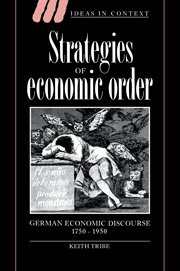Book contents
- Frontmatter
- Contents
- Acknowledgements
- 1 Introduction: From Cameralism to Ordoliberalism
- 2 Cameralism and the science of government
- 3 Die Vernunft des List. National economy and the critique of cosmopolitan economy
- 4 Historical Economics, the Methodenstreit, and the economics of Max Weber
- 5 The Handelshochschulen and the formation of Betriebswirtschaftslehre, 1898–1925
- 6 The Logical Structure of the Economic World – the rationalist economics of Otto Neurath
- 7 Capitalism, totalitarianism and the legal order of National Socialism
- 8 The genealogy of the Social Market Economy: 1937–48
- 9 The New Economic Order and European economic integration
- Bibliography
- Index
- Ideas in Context
2 - Cameralism and the science of government
Published online by Cambridge University Press: 14 September 2009
- Frontmatter
- Contents
- Acknowledgements
- 1 Introduction: From Cameralism to Ordoliberalism
- 2 Cameralism and the science of government
- 3 Die Vernunft des List. National economy and the critique of cosmopolitan economy
- 4 Historical Economics, the Methodenstreit, and the economics of Max Weber
- 5 The Handelshochschulen and the formation of Betriebswirtschaftslehre, 1898–1925
- 6 The Logical Structure of the Economic World – the rationalist economics of Otto Neurath
- 7 Capitalism, totalitarianism and the legal order of National Socialism
- 8 The genealogy of the Social Market Economy: 1937–48
- 9 The New Economic Order and European economic integration
- Bibliography
- Index
- Ideas in Context
Summary
To the important and relevant question: Which are the two most secure and important foundations for making people, Reich and Land happy? the wise and courageous monarch Cyrus made, in all his experience and power, the following response: Eine auserlesene Armee und eine gute Wirthschqfft der Unterthanen.
In 1727 Friedrich Wilhelm I decreed that a chair for ‘Oeconomie, Policey and Kammer-Sachen’ be established at the University of Halle; shortly after, a further chair was founded at the University of Frankfurt on the Oder. This marked the formal inauguration of courses of study for future state officials, and hence of the formation of ‘Kameral- und Polizeiwissenschaften’. In the previous century a series of texts had appeared – among them von Seckendorf's Teutscher Fürsten-Stat (1656), Becher's Politische Discurs (1668) and von Schröder's Fürstliche Schatz- und Rentenkammer (1686) – which were composed for the rulers of the Protestant states of the Holy Roman Empire. These seventeenth-century advisory tracts set up a relationship between the interests of a ruler and the welfare of his subjects, arguing that if a ruler wished to secure his power, then he should first attend to the welfare of his subjects. In the early eighteenth century this idea was transferred to the lectureroom, and made the basis of the new cameralistic sciences.
- Type
- Chapter
- Information
- Strategies of Economic OrderGerman Economic Discourse, 1750–1950, pp. 8 - 31Publisher: Cambridge University PressPrint publication year: 1995
- 1
- Cited by



